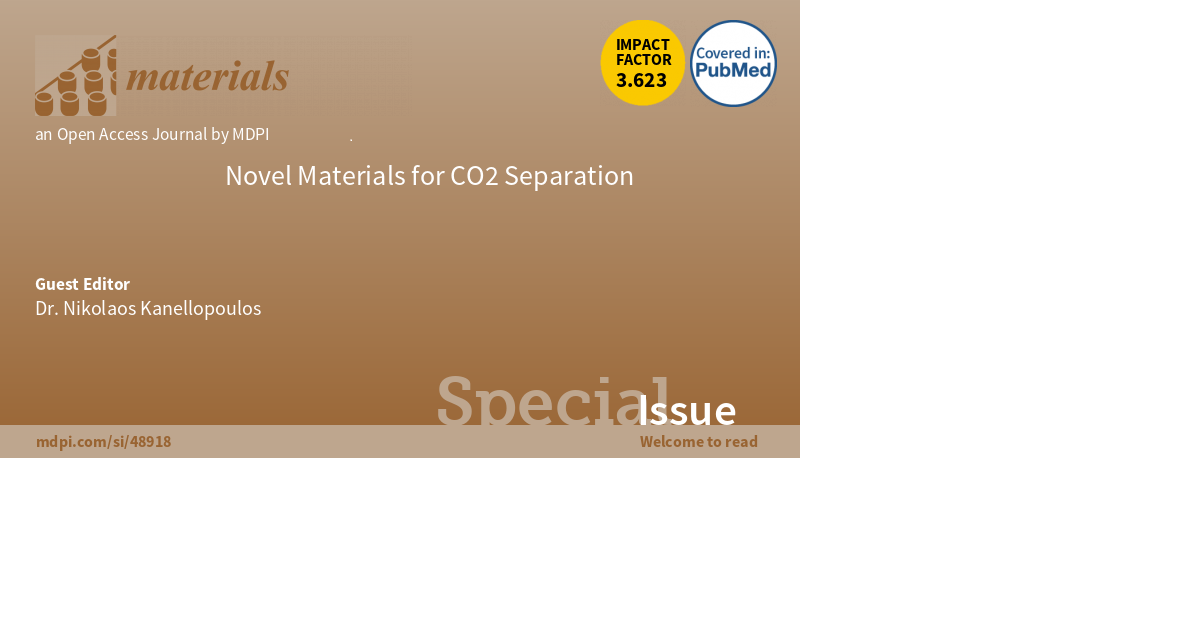- 3.2Impact Factor
- 6.4CiteScore
- 16 daysTime to First Decision
Novel Materials for CO2 Separation
This special issue belongs to the section “Materials Physics“.
Special Issue Information
Dear Colleagues,
The requirement of more energy-efficient water treatment and CO2 capture and conversion technologies are major global challenges, since the estimated cost of the abrupt sea level rise ranges from $200 to $800 trillion over the next 30 years, and the estimated cost of CO2 capture and storage at $40/ton of CO2 captured is on the order of $16 trillion. Βased on this, if the aforementioned cost of the sorption CO2 capture technologies will be reduced down to $20/ton of captured CO2, the estimated savings will range from $192 to $792 trillion.
One of the most promising approaches to achieving the aforementioned required cost reduction of the CO2 is the development of “next-generation” sorbent and membrane materials and their effective deployment in novel design sorption and membrane intensified processes in order to drastically reduce the CO2 capture cost by $8 trillion. Equally important is the challenge of converting the captured CO2 to high-added-value chemicals.
Regarding the challenge of the global warming, it is estimated that a total cumulative mass of approximately 100 Giga-tonnes CO2 will need to be captured and stored or converted cost-effectively between 2030 and 2050. One major need is the reduction in the required energy capture down to 1.5 GJ/ton CO2 captured. To this end, the development of “next-generation” low-cost, high CO2 sorption capacity, and high CO2 diffusivity sorbents as well as low-cost, high CO2 flux membranes and their deployment in novel sorption, membrane, and hybrid sorption/membrane processes is necessary.
In addition, regarding the disposal of the captured CO2, the development of cost-effective conversion processes for captured CO2 based on novel catalysts, high flux separation, and catalysis can provide the required low-energy conversion of the captured CO2 to fuels and chemicals.
It is my pleasure to invite you to submit a manuscript for this Special Issue. Full papers, communications, and reviews are all welcome.
Dr. Nikolaos Kanellopoulos
Guest Editor
Manuscript Submission Information
Manuscripts should be submitted online at www.mdpi.com by registering and logging in to this website. Once you are registered, click here to go to the submission form. Manuscripts can be submitted until the deadline. All submissions that pass pre-check are peer-reviewed. Accepted papers will be published continuously in the journal (as soon as accepted) and will be listed together on the special issue website. Research articles, review articles as well as short communications are invited. For planned papers, a title and short abstract (about 250 words) can be sent to the Editorial Office for assessment.
Submitted manuscripts should not have been published previously, nor be under consideration for publication elsewhere (except conference proceedings papers). All manuscripts are thoroughly refereed through a single-blind peer-review process. A guide for authors and other relevant information for submission of manuscripts is available on the Instructions for Authors page. Materials is an international peer-reviewed open access semimonthly journal published by MDPI.
Please visit the Instructions for Authors page before submitting a manuscript. The Article Processing Charge (APC) for publication in this open access journal is 2600 CHF (Swiss Francs). Submitted papers should be well formatted and use good English. Authors may use MDPI's English editing service prior to publication or during author revisions.
Keywords
- sorbents
- membranes
- catalysts
- CO2 capture
- CO2 conversion
- global warming

Benefits of Publishing in a Special Issue
- Ease of navigation: Grouping papers by topic helps scholars navigate broad scope journals more efficiently.
- Greater discoverability: Special Issues support the reach and impact of scientific research. Articles in Special Issues are more discoverable and cited more frequently.
- Expansion of research network: Special Issues facilitate connections among authors, fostering scientific collaborations.
- External promotion: Articles in Special Issues are often promoted through the journal's social media, increasing their visibility.
- Reprint: MDPI Books provides the opportunity to republish successful Special Issues in book format, both online and in print.


